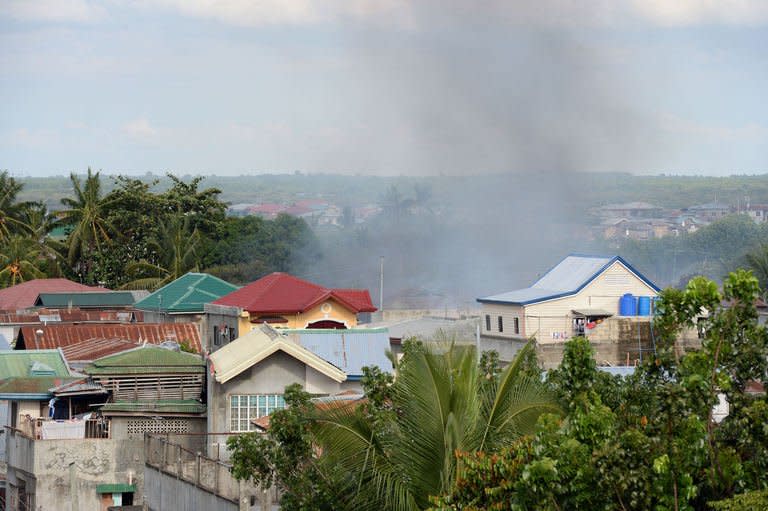Philippine rebels use 'human shields' in stand-off with troops
Muslim militants were using 180 residents as "human shields" Tuesday, Philippine officials said, as they traded gunfire with troops amid burning houses during a standoff after a deadly attack on a southern city. Machinegun fire rang out in the deserted streets of Zamboanga as marines targeted fighters from the Moro National Liberation Front (MNLF) who stormed the city Monday intent on derailing peace talks. Several houses were ablaze but rebel sniper fire prevented fire trucks from nearing the scene. "We are scared. We just want this to end as soon as possible so we can get on with our lives," security technician Ed Laguatan told AFP as he cowered inside his house amid the barrage of gunfire. "We can see them (the rebels) just next door... It looks like they are ready to die fighting." The fighting began before dawn Monday as rebels stormed the city of one million people from nearby towns and islands, killing four and injuring 14. Naval commandos also killed seven MNLF members at sea on the same day as they tried to enter the city, Philippine Navy spokesman Lieutenant-Commander Gregory Fabic told AFP Tuesday. Military spokesman Lieutenant-Colonel Ramon Zagala said 180 MNLF gunmen armed with rifles and mortars were now surrounded by about 1,500 elite troops backed by a smaller number of police. But MNLF spokesman Emmanuel Fontanilla told DZMM radio that the rebels were prepared to dig in. "Our forces will stay where they are. They are on a defensive posture," he said. President Benigno Aquino refused to set a deadline for resolving the crisis. "We can't be giving deadlines when what we want to ensure is that no more civilians are affected, hurt or killed," he told reporters in Manila. Interior Secretary Mar Roxas told a news conference authorities were trying to negotiate with the gunmen. About 180 residents were being used as "human shields" in six districts where the rebels are holed up surrounded by security forces, he said. The government had described the people as "hostages" but Roxas said it appeared most were free to leave if they wished. "It appears that what happened is not hostage-taking but more of them being turned into human shields by the MNLF forces who entered their communities. People are free to get in and out of there, they are not bound, they are not detained," he said. "Whether they are hostages or not is still being validated," he added. Among them is local Catholic priest Father Michael Ofana, his father and a brother, said Zamboanga Mayor Maria Isabelle Climaco Salazar. MNLF founder Nur Misuari had declared "independence" for the Muslim southern regions of the mainly Catholic Philippines on August 12, and called on his followers to besiege government installations. He could not be reached Tuesday by AFP, nor by government negotiators. A mid-afternoon fire that gutted several houses was left to burn after fire trucks were stopped by security forces who warned them about sniper fire, said city fire marshal Dominador Zabala. "We could not go much closer as there was no go-signal from the ground forces in the area," he said, adding they suspected the rebels of setting the blaze. The fighting has displaced about 1,500 residents of the mainly Muslim districts, including women and children who were forced to spend the night sleeping on the floor of crowded gyms after fleeing the conflict. Misuari has criticised a preliminary peace deal signed last year by the government and the Moro Islamic Liberation Front, which split from the MNLF in 1978. He said the agreement marginalised his group and a peace treaty that it signed in 1996. The gunmen launched their attack as the government prepared to resume peace talks with the MILF, aimed at ending a 42-year-old rebellion that has claimed 150,000 lives. It was the second such attack on Zamboanga since 2001, when Misuari's men men also took dozens of hostages and left many more dead, but were given safe passage out of the city by freeing their captives. Misuari fled to Malaysia, where he was arrested and deported, and was kept in police prisons in Manila until the government dropped all charges against him in 2008.




